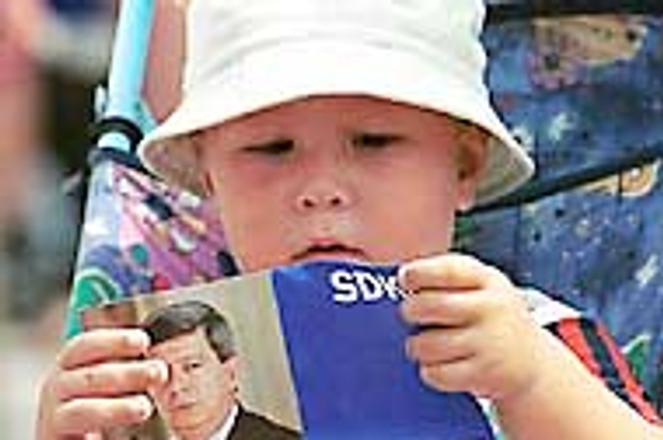SDKÚ is betting on old faces.photo: TASR
THE RULING SLOVAK Democratic and Christian Union party offers a candidates list brimming with political veterans, but given the public's distaste for its current and past leaders, that apparent advantage may even work against it in September elections, according to a political analyst.
Nor has the Democratic and Christian Union (SDKÚ) project fulfilled its founders' main aims in launching the party in 2000 - to unite Slovakia's right-wing forces under a major political label and do away with smaller parties described by Prime Minister Mikuláš Dzurinda as "discussion clubs" for their members.
The SDKÚ party is running at between seven and eight per cent voter support, at times behind five other parties and far from the 20 per cent the party set out to capture.
Part of the problem has been that several other parties have successfully competed for right-wing voters. Apart from the Christian Democrats (KDH), the non-parliamentary New Citizen's Alliance (Ano) and the Hungarian Coalition Party (SMK) have scored around 10 per cent in polls as well.
Another handicap has been that many of the SDKÚ's politicians are old names in politics, drawn from the two strongest parties of the five that in 1998 formed the Slovak Democratic Coalition - the liberal Democratic Union and the conservative KDH.
"The connection of liberals and Christian democrats resulted from Prime Minister Mikuláš Dzurinda's desire for a strong right-wing party," said Grigorij Mesežnikov, head of the Institute for Public Affairs (IVO) think tank.
Most top SDKÚ candidates for September's general elections are experienced statesmen with decade-long pedigrees in politics.
Prime Minister Mikuláš Dzurinda, who is also the SDKÚ chairman, heads the group of former KDH members on the SKDÚ's candidate list.
Dzurinda has held a number of important positions throughout his political career - he first served as Deputy Transport Minister and later in 1994 occupied the Transport Ministry top job. After being the KDH's deputy chair for economy, in 1997 he became the SDK's spokesperson, and later was picked as its leader.
Interior Minister Ivan Šimko, who is also the party's general secretary, stands at number four on the candidate list.
With university degrees in both economy and law, Šimko started his political career in 1989 as advisor to the Czechoslovak federal deputy PM. From 1990-1992 he was a member of the federal parliament and head of its security committee.
He later held important offices in Slovak governments, such as Justice Minister and Deputy PM. He was a founding member of the KDH, where he served as deputy chair for internal policy between 1996 and 1998.
Milan Gaľa, number seven on the SDKÚ's candidate list, was a KDH member from 1990 to 1997, and has been an MP several times. Since 1999 he has been healthcare advisor to Dzurinda.
Milan Hort, number eight and also an MP, has been involved in local government for a number of years as the mayor of Nová Dubnica from 1990 to 1994. In 1990 he joined the KDH, becoming the party's deputy chairman for communal politics in 1997.
Eduard Kukan, Slovak Foreign Minister and SDKÚ deputy chairman, occupies number two on the candidates list, and originally came from the now-defunct Democratic Union party.
Kukan is a professional diplomat who acted as Czechoslovak representative to the United Nations between 1990 and 1992, and was Slovak ambassador there until 1994 after the creation of independent Slovakia.
In 1997 he was elected chairman of the Democratic Union, but later became one of the SDKÚ's co-founders.
The political past of Roman Vavrík, SDKÚ's number nine, is also tied to the Democratic Union. Vavrík first entered politics in 1991, taking the advisor for state and local administration job at the cabinet office. In 1994 he was briefly Deputy Interior Minister. He has been an MP since 1994 and since then has also served as deputy mayor of Bratislava. He is head of the SDKÚ's Bratislava region branch.
Other SDKÚ candidates have a background in the tiny Democratic Party (DS), with Deputy PM for Economy Ivan Mikloš the best known figure among them.
Between 1990 and 1991 Mikloš was head of the cabinet office economy division, and was the country's Privatisation Minister from 1991 to 1992.
He entered politics with the Civic Democratic Union (ODÚ), and after the split of Czechoslovakia became a member of the DS in 1993, remaining in the party until 2000. Mikloš is number three on the SDKÚ candidate list.
Peter Miššík, at number 12, co-founded the DS in 1989 and served as DS deputy chairman between 1991 and 1992. In 1998 he was appointed head of the Nitra regional state office by the cabinet. He joined the SDKÚ along with Mikloš in 2000.
Zuzana Martináková, SDKÚ deputy-chair for the third sector, worked as a BBC Slovakia correspondent from 1993 until joining the party in 2000.
According to Mesežnikov, the long political careers of many of SDKÚ members may be prove to be a disadvantage for the party in nearing elections, given the public's almost 80 per cent disapproval rating of the current administration.
Despite the fact that SDKÚ candidates "have a certain level of experience", and that "some have a good reputation", the analyst saw nothing in the list that could significantly change the party's current popularity ratings.
"The SDKÚ candidate list is a standard one, with no disadvantages in comparison with other political parties. But there isn't anything above-standard either," Mesežnikov said.


